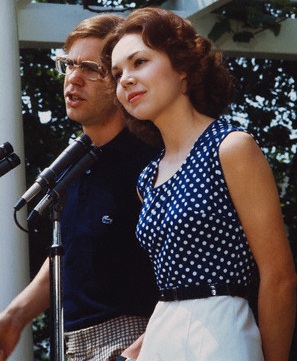|
|
|
Helen Thomas was the former dean of the White House press corps. Her book Thanks for the Memories, Mr. President was published in 2002. Also by Helen Thomas--Dateline: White House (1975), and Front Row at the White House: My Life and Times (1999).

I WILL ALWAYS CONSIDER REMARKABLE the joint news conference Julie and David
held in the East Garden in May 1974. John F. Kennedy might have called it a "profile
in courage," with both of them facing a barrage of penetrating questions on
Watergate. I had pressed the First Lady's press secretary, Helen Smith, for an interview
with Julie after the release of the massive White House tapes and subsequent calls
for Nixon's resignation. Other reporters apparently did the same thing and a press
conference was arranged to accommodate all of us.
I had the first question
and asked, "Do either of you foresee any circumstances where the president would
resign?"
"Absolutely not, no," said David. He added that his
answer was "categorical."
Julie replied, "You know, Helen,
I am not surprised by the question. In fact, Helen Smith called David and me yesterday
and said so many members of the media have wanted to talk to us and that this was
the number-one question. Then yesterday I got three calls from friends in different
states saying,'We have heard these rumors. Is it true they are drawing up papers
of resignation?' That is one of the rumors floating around, and I don't know how
those rumors get started, but there really is no truth to it at all. He is stronger
now than he ever has been in his determination to see this through."
Julie and David had been primed for the question-and-answer session the night before
during a cruise down the Potomac River with the President and Mrs. Nixon aboard the
yacht Sequoia.
CBS correspondent Robert Pierpont shook Julie for a
moment when he observed, "Mrs. Eisenhower, may I say first of all, that I feel
I have to apologize for addressing these questions to you, since in our system we
do not hold the sins of the fathers against the following generations, and we don't
have a monarchy in which you are going to inherit the power. I am not quite sure
why you are here to answer these questions."
"Mr. Pierpont,"
Julie responded, her voice quavering with emotion, "I am going to try
to control myself in answering the question because it really does wound me. First
of all, I am here to answer these questions because Helen Smith said that she received
fifty-five phone calls from members of the media wanting to know the family's reaction
and wanting to know if my father was going to resign.
"Now if the media
has a hangup and an obsession about resignation and feels that they must be reassured
from members of the family that my father is not going to resign, I feel that as
a daughter it is my obligation to come out here and to say, 'No, he is not going
to resign.' "
Julie continued, saying that her father "does not
want me out here because he does not want anyone to construe that I am trying to
answer questions for him. I am not trying to answer questions for him. I am just
trying to pray for enough courage to meet his courage. Really."
Questioned
on whether Nixon had discussed resigning with his family, she admitted he had and,
"he has said—in fact last night, it was a very great quotation, very quotable—he
said he would take this constitutionally down to the wire. He said he would go to
the Senate, and he said if there was one Senator who believed in him, that is the
way it would be. So if the Committee votes a bill of impeachment, if the House goes
through with it, if it goes to the Senate, he has said if there is only one Senator
that it is going to be a constitutional process."
Julie, in the same
news conference, called the beginning of Watergate a "third- or fourth-rate
burglary," reminiscent of Press Secretary Ronald Ziegler's first public comment
on the subject in 1972. She commented that Nixon's enthusiastic aides simply tried
to win "brownie points" with the President, but went too far.
No daughter ever had greater love for her father. Julie believed in her father
and battled the growing forces seeking his resignation or impeachment. She insisted
her father was not going to "bug out" and she and her mother were the last
to be convinced he should relinquish his post.
from Dateline: White House (1975) by reporter Helen Thomas